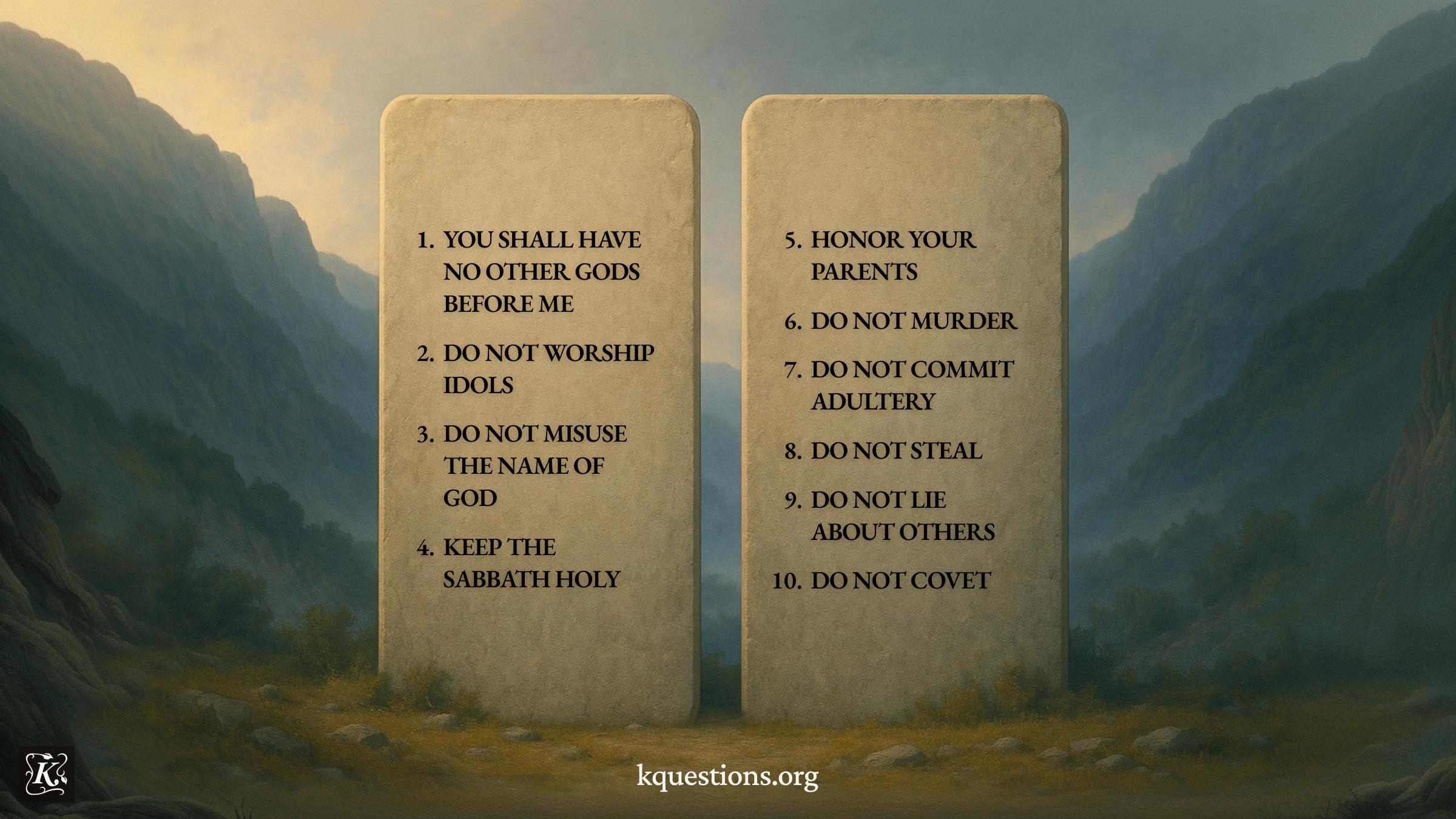
All Christians (including Catholics) and Jews agree with the content below, though numbering can vary slightly. For more, see the end.
Ten Commandments List (Shortened Versions)
- You shall have no other gods before me.
- Do not worship idols.
- Do not misuse the name of God.
- Keep the Sabbath holy.
- Honor your parents.
- Do not murder.
- Do not commit adultery.
- Do not steal.
- Do not lie about others.
- Do not covet.
The following carefully blends original text accuracy with understandability. It draws from many top translations across Christ-centered communities. [1]
Left Tablet: Duties to God
Exodus 20v2-11
“I am the LORD your God who brought you out of the land of Egypt, out of the house of slavery” (v. 2)
- You shall have no other gods before Me. (v. 3)
- You shall not make idols or carved images of anything in the heavens above, on the earth beneath, or in the water below. You shall not worship or serve them, for I the LORD your God, am a jealous [impassioned] God, visiting the sin of the fathers on the children to the third and even fourth generation of those who hate me, but I lavish unfailing love for a thousand generations on those who love me and keep my commandments. (v. 4-6)
- You shall not misuse the name of the LORD your God. For the LORD will not leave unpunished anyone who invokes his name in vain. (v. 7)
- Remember to observe the Sabbath day and keep it holy. Six days you shall labor and do all your work: But the seventh day is a Sabbath to the LORD your God. You shall not do any work, whether you, your children, your servants, your animals, or your foreign guests. For God made the heavens, the earth, the sea, and everything in them in six days then rested on the seventh day. He blessed it and set it apart as holy. (v. 8-11)
Right Tablet: Duties to Neighbor
Exodus 20v12-17
- Honor your father and your mother, that your days may be long in the land that the LORD your God is giving you. (v. 12)
- You shall not murder. (v. 13)
- You shall not commit adultery. (v. 14)
- You shall not steal. (v. 15)
- You shall not testify falsely against your neighbor. (v. 16)
- You shall not covet your neighbor’s house—or wife or servant or ox or donkey. Do not set your heart on anything that is your neighbor’s. (v. 17)
Most Common Questions
What does "covet" mean?
The Hebrew word chamad ( חָמַד ) means to desire or crave something that belongs to someone else. It's not just admiring your neighbor's car; it's an internal longing that leads to resentment, scheming, or other sins. Take note that it’s the only commandment addressing the heart's desires rather than outward actions.
Why is God described as "jealous"?
The Hebrew qanna ( קַנָּא ) doesn't mean petty envy. It describes God's passionate, protective love. It’s best compared to a spouse's rightful jealousy when their marriage is threatened. God's "jealousy" is a refusal to share what truly belongs to God alone and a love that doesn't tolerate the undoing or destruction of His beloved.
Does God punish children (or great-grandchildren!) for their parents' sins?
The phrase "visiting iniquity to the third and fourth generation" highlights how the consequences of destructive choices often ripple through families and communities over time.
Modern research overwhelmingly confirms this. For example, children of alcoholics are much more likely to become alcoholics themselves, and cases of father abandonment or abuse are statistically the strongest predictors of these patterns cyclically emerging in following generations.
Ezekiel 18 clarifies that each person is morally responsible for their own actions. The warning here is about how sin’s impact is rarely isolated. It doesn’t just hurt those around us, it can also set in motion generational patterns.
But the verse doesn’t stop there. The Bible flips the scary script of “up to four generations” to instead emphasize the exceeding power of God’s mercy and faithfulness, which extends “to thousands” of generations.
Are the Ten Commandments still relevant for Christians today?
The short answer is: Yes—but not in the same way as before Christ.
Christians can sometimes be quick to dismiss the Ten Commandments in light of the “new covenant” of Jesus. But remember, Jesus regularly promoted reverence for them and the broader “Law” of God. And there is great richness to his claim that he came not to “abolish” the Law but to “fulfill” it. (Matthew 5v17) He didn’t replace it—he showed us the very heart of all of it (love God, love neighbor).
Every single commandment is actually restated as a command in the New Testament except for one: the Sabbath, which is not cast aside, but reframed.
Jesus claimed authority over the Sabbath (Mark 2v27-28), and the earliest Christians did not require Gentile believers to keep the Sabbath as Jews did. Since then, a strict day-of-rest rule ceased with Jesus’ followers.
Hebrews 4 makes this even clearer, directly tying the weekly practice to the hope found in Christ. As we take pause from our striving, we look forward to the ultimate fulfillment of God’s promises of rest.
So Christians are invited into Christ’s rhythmic gift of rest and to discern how their lives in particular should honor God with all of their time—both hard work and quality rest that recognizes God as the ultimate doer, not us.
The Ten Commandments remain an essential mirror that exposes sin (Romans 3v20), a schoolmaster that instructs us (Galatians 3v24), an expression of God’s character (Exodus 34v6-7), and a blueprint for wise living (Psalm 19v7-8)—and Jesus is our ultimate interpreter (Matthew 5v17-18)
Why are the Ten Commandments making a comeback?
In recent years, there's been renewed interest in moral codes, even outside Christian circles. The Ten Commandments are—without question—the most famous moral code in human history. We see this as a reaction to the confusion and failures of decades of moral relativism and rejection of God.
But notice: much of society’s renewed moral focus is “cherry-picking.” People embrace certain ethical principles (like truth-telling, justice, or care for the vulnerable) as cultural slogans, but often as a way to attack opponents or claim the moral high ground. Even appeals to “God,” a “higher power” or “universal values,” though they can sound humble, can stealthily keep ultimate authority in human hands. When God-talk is vague, concepts can be flexibly molded to fit our agendas and visions of justice or progress, rather than submitting to the defined God revealed in greatest fullness through Jesus.
The difference is profound. Real flourishing comes from recognizing the true God as God, specifically as revealed in Christ, not adopting abstract "values." When God is truly God, justice and goodness have an anchor much deeper than human opinion, and we're called to submit to (not just invoke) the divine.
Closing Thoughts
Now let’s wrap it up.
Our studies of this profound passage led us to many insights too detailed for this piece, so we’re reserving them for a separate “Ten Insights on the Ten Commandments”, or similar. We’ll link it here when it’s ready.
We’ll leave you with a special one:
The Two Tablets: A Distinction and Insight To Transform Your Life
Scripture explicitly mentions that God wrote the Ten Commandments on "two tablets of stone" (Exodus 31v18, Deuteronomy 4v13), but doesn't specify how the commandments were divided between them.
However, from early Jewish thought, to early Christian teaching, to medieval theologians, and continuing today, there's remarkable consistency in recognizing the first four commandments as governing our relationship with God (the "left tablet") and the last six as governing our relationships with one another (the "right tablet").
This division reflects the profound theological insight that a right vertical relationship with God enables right horizontal relationships with others.
Jesus beautifully affirmed this principle when he summarized the entire law as 1) love for God and 2) love for neighbor (Matthew 22v37-39).
Conclusion: Words That Shape Worlds
The Ten Commandments remain humanity's most influential moral code not because they're simple or shared rules, but because they're profound declarations about the nature of God, humanity, and the relationship between them.
In our age of moral confusion, these ancient words offer a positive vision: a society built on reverence for God, respect for parents, protection of life, fidelity in relationships, security of property, commitment to truth, and contentment with one's portion. They're wise statements with a clear purpose: human flourishing, which is as relevant today as when they were first spoken from Sinai's heights.
---
Top Nuance Points
- [1] On Translations: At KQuestions, we value both precision-focused translations like the NASB and ESV, blends like Bible Project’s work, and readability-focused ones like the NIV, NLT, and paraphrases. As a bridge-building source, we also reference the NABRE to honor Catholic perspectives despite our Protestant lean. Similarly, we draw on the 1985 JPS Tanakh to acknowledge the deep Jewish heritage and its significance for understanding God and the Bible, while making it clear that Judaism and Christianity remain distinct.
- [2] Jewish and Catholic Numbering Variations: Jewish tradition counts "I am the LORD your God who brought you out of Egypt" as the First Commandment, emphasizing God's identity and redemptive act as the foundation. Catholics and Lutherans (Protestant subgroup) combine "no other gods" and "no idols" into one First Commandment, then split "do not covet" into two separate commandments (coveting neighbor's wife vs. goods) to maintain ten total. Just about everyone else treats the opening as a preface and numbers items as shown above. Despite these differences, all traditions affirm the same essential words and content.






